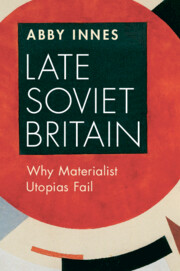2 results
Introduction
-
- Book:
- Late Soviet Britain
- Published online:
- 14 September 2023
- Print publication:
- 28 September 2023, pp 1-20
-
- Chapter
- Export citation

Late Soviet Britain
- Why Materialist Utopias Fail
-
- Published online:
- 14 September 2023
- Print publication:
- 28 September 2023

